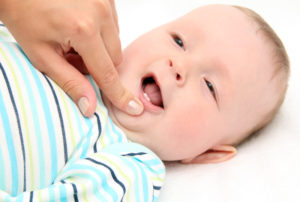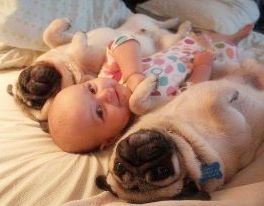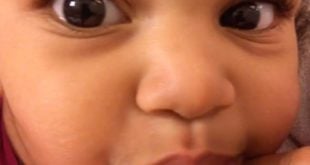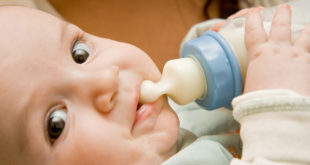 Many new mothers tell me that they plan to nurse their babies for six months, or until they get teeth. With the AAP (American Academy of Pediatrics) now recommending nursing for at least a year, it makes sense to re-examine our ideas about breastfeeding babies with teeth. I have had two babies out of six who got teeth at four months, so if I had weaned them at that stage, they wouldn’t have been able to nurse for long at all.
Many new mothers tell me that they plan to nurse their babies for six months, or until they get teeth. With the AAP (American Academy of Pediatrics) now recommending nursing for at least a year, it makes sense to re-examine our ideas about breastfeeding babies with teeth. I have had two babies out of six who got teeth at four months, so if I had weaned them at that stage, they wouldn’t have been able to nurse for long at all.
Most babies will cut their first teeth sometime around six months. Usually the first teeth come in fairly easily, accompanied by a lot of drooling and chewing everything he can get his hands on. Cutting teeth may make your baby’s gums swollen and sore, and he may try to chew on the nipple just as he chews on everything else to relieve his discomfort.
The first molars, cut at about a year, tend to cause the most discomfort. The very first tooth, and the second one that will follow it soon afterwards, will be bottom front teeth. It will probably be months before the matching top teeth come in, so even if he tries, he can’t really bite effectively (closing the top teeth against the bottom teeth) for a while. That doesn’t mean that a bite won’t be uncomfortable with one or two bottom teeth, however. We’ll discuss why some babies bite, how to prevent biting, and what to do if you do get bitten.
By the way, baby’s teeth come in a particular order, but at widely varying ages and intervals. Early teething doesn’t mean your baby will be advanced intellectually, and late teething doesn’t mean he’ll be slow in other areas.
Many babies never ever bite at all, and most who try it once usually respond to your startled reaction by never doing it again. With some babies, it is a little harder to break the habit, but all babies, no matter how old, can learn not to bite.
A baby who is latched on and nursing properly cannot bite the breast. If the nipple is positioned far back in his mouth, and his lips and gums are positioned about an inch behind the nipple on the areola, then his tongue will cover his gums, between his lower teeth and your breast. If he is actively nursing, he can’t bite – and if he is biting, he can’t be actively nursing at the same time. He should never really close his teeth on the breast while nursing, but his upper teeth will occasionally cause an imprint on the areola due to slight pressure exerted during feedings. This usually occurs with older babies, and is seldom painful. If it is uncomfortable, you can take him off and re-latch him. That will usually take care of the problem.
Here are some tips on how to prevent biting:
-
-
- Sometimes babies bite to get your attention. As he gets older, you tend to talk on the phone, read, or watch TV while nursing instead of focusing on your baby. Try to maintain eye contact, speak to him, and touch him while he is nursing. This way he will know he has your attention, and he will be less likely to bite. You will also be more likely to recognize signs that he is ready to end the feeding if you are paying attention to him.
- Watch closely for cues that he is done with a feeding. Some babies will start to fidget, pull off the breast and look around, or even tense their jaws right before they clamp down. Learn to read his signals.
- Biting is most likely to occur when your baby is full and loses interest in nursing, toward the end of a feeding. Look for for signs that he is ready to stop the feeding, so you can take him off before he bites.
- Check to see that he is latched on correctly. Make sure his mouth is open wide, and pull him in closely so the nipple is far back in his mouth. Sometimes after he has been nursing awhile, he gets sleepy and the nipple pulls back in his mouth, and he may bite reflexively as he feels the nipple slipping away.
- Don’t try to force him to nurse. The one time I got bitten that I really remember (and this is with nursing six babies) was during a breastfeeding class I was teaching when my youngest was seven months old. He was getting a little antsy, so I decided to put him on he breast to settle him down for a few minutes while I finished my talk. He was not at all interested in nursing, and bit down hard enough to break the skin. Then he grinned at me like he had done something really funny. I jumped about three feet off the chair, which my audience found vastly amusing. It was a great visual aid to demonstrate biting in a teething infant, my nipple was sore for days. By the way, he nursed for years after that and never bit me again.
- Minimize distractions by dimming lights, turning off the TV, playing soothing music, or lying down in a quiet room. These techniques may help your baby settle down to nurse without biting.
- Sometimes babies will clamp down on the nipple if their nose is congested and it is difficult for them to breathe. If they don’t have a clear airway, they may not suck effectively, and the nipple may fall forward in their mouth. Check with your doctor for treatment options if your baby has nasal congestion that is interfering with breastfeeding.
- Try to keep your milk supply plentiful. Sometimes babies will bite out of frustration when your supply falls and the milk isn’t flowing as freely as they are used to. This can also occur when you have plugged ducts.
- If your baby does bite you, your natural response is to exclaim loudly and pull him away from the breast. This will usually startle him, and he will release the nipple and react with surprise. Often his feelings will be hurt and he will begin to cry. This is negative reinforcement that immediately follows the behavior you want to discourage, and is often enough to keep him from ever biting again. Some very sensitive babies will be so upset by your reaction that they will temporarily refuse to nurse altogether. See the article on Nursing Strike for tips on how to get him back on the breast.
-
Here are some tips on what to do if your baby bites you:
-
-
- You do not want to pull him off your breast, although that is your natural reaction. Instead, pull him in close to you. His nose will be pressed against your breast and he will open his mouth so he can breathe. This is better than pulling him off, because then the nipple is stretched out while he is clamping down on it, and you may cause more pain and damage to the tissue than the bite itself. You can also slip your finger in between his gums or teeth to get him to open his mouth and let go of the nipple.
- Stop the feeding immediately if he bites you. Even a very young infant can learn that if he wants to nurse, he can’t bite. If he is teething, offer him something to teethe on, such a teething toy, a cold washcloth, a frozen bagel or banana (if he is eating solids), a breastmilk popsicle, or a knuckle (my baby’s favorite).
- Doctors no longer recommend using OTC teething preparations like Orajel. They contain benzocaine, a local numbing agent rubbed on the gums but have been shown to cause a rare medical condition called “methemoglobinemia”. Symptoms include blue skin, lips, and nail beds, headache, lightheadedness, tiredness, rapid heart rate, and shortness of breath, which may appear after on application, or several hours later. Because of these concerns, the FDA doesn’t recommend using them on children under two. In my opinion, they never did help much anyway. They numbed the gums for a few seconds, and that was it.
- If he tends to bite at the beginning of a feeding, offer him a teething substitute before the feeding. Even very young babies can learn that some things are appropriate to bite down on, but your nipple isn’t one of them.
- If your baby continues to bite, you may want to tell him in a firm voice, “No, that hurts Mommy!’ and set him down on the floor. He won’t like it, but he will quickly learn that if he wants to nurse, he can’t bite. Be sure to comfort him after a few seconds, but don’t continue to let him nurse if he bites.
- Some older babies like to try to look around the room while they are nursing. This means that they turn their head while the nipple is clamped between their gums or teeth. Try to minimize distractions, but if he tries to turn his head while nursing, put your index finger in his mouth immediately. He will soon learn that when he turns away, he loses the nipple.
- Sometimes older babies decide to wean themselves. I had three babies wean before they were a year old. They were ready, but I wasn’t. A baby who consistently bites every time you try to nurse him, in spite of trying all the above suggestions, may be telling you that he is done with nursing. Babies younger than nine months will rarely wean themselves. There is very little you can do if a baby decides to wean, because it is just about impossible to make a baby nurse if he really doesn’t want to. I suggest that with babies of any age, (but especially those twelve months or younger) you try to encourage them to continue breastfeeding because of the many nutritional, emotional, and immunological benefits. Sometimes a baby who is not feeling well, whose mouth is sore due to teething or thrush, or who is emotionally upset over something will temporarily refuse to nurse, but this is rarely permanent. If, in spite of all your best efforts to keep him nursing, your baby decides to wean, you can feel good about the time he did nurse, and know that he chose to end the nursing relationship when he was ready to move on to the next developmental stage.
-
(Edited September, 2018)
Anne Smith, IBCLC
Breastfeeding Basics
*Please ‘Pay it Forward’!*I
If you found this article helpful, please consider making a small donation to my favorite cause – Project Pets: Spay, Neuter, Love, an all volunteer, non-profit organization that provides free spay and neuter services for homeless rescue dogs and cats…because every baby deserves a home, whether they have two legs or four! To find out more about how you can help, visit Project Pets on Facebook.
 Breastfeeding Basics
Breastfeeding Basics





